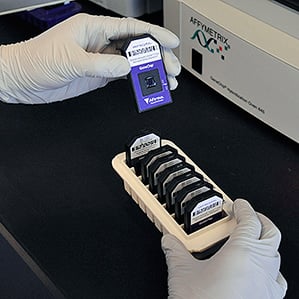Gene Test Helps Patients Avoid Thyroid Surgery
Later this year, doctors in the U.S. will be able to use a gene test to guide thyroid cancer surgery. The test helps determine when patients harbor a particularly dangerous form of the disease, which can require surgeons to do a second operation on top of the initial diagnostic procedure. Knowing that a patient has this particular form of thyroid cancer could enable surgeons to instead do a single, more extensive surgery.

The company behind the test, Veracyte, already sells a unique genetic assay that helps doctors decide whether to perform surgery on thyroid cancer patients at all. Thyroids that are not cancerous are often removed, which means unnecessary surgery and lifelong hormone replacement therapy for some patients.
Both tests are part of a broader movement in recent years to bring genetic tests into medical care, with oncology leading the way. One test, from Myriad Genetics, looks for mutations linked to increased risk of cancer; others, such as one offered by Foundation Medicine, help doctors prescribe drugs tailored to a particular tumor (see “Foundation Medicine: Personalizing Cancer Drugs”).
Veracyte’s first test is the only one that rules out cancer. A lump, or nodule, is caused by growths of cells in the thyroid gland, which is located in the base of the neck. Most often these growths are not cancers. To figure out whether they are, doctors will first take a small needle to extract cells from the lump and then look at the cells under the microscope. And up to 30 percent of the time in U.S. clinics, that test is inconclusive. Because cancer can’t be ruled out, typically the next step is to remove the thyroid. The gland normally produces important hormones that regulate metabolism and other body functions, so patients usually then have to take hormone replacement therapy for the rest of their lives.
Between 60 and 80 percent of the time, the nodule in the removed thyroid turns out to be benign. “You have unnecessarily put a patient through surgery,” says Kishore Lakshman, director of a community thyroid care center in Fall River, Massachusetts. This puts patients at risk for complications such as infection, and creates dependence on hormone therapy. Since 2011, Lakshman has been using Veracyte’s gene test to assess the risk of cancer in patients whose initial thyroid screen was inconclusive. “When I found out that there was a very efficient way of knowing the benign potential of a nodule without exposing a patient to surgery, I was quick to jump on it,” says Lakshman.
Veracyte analyzed gene expression levels in hundreds of patients with thyroid nodules, some cancerous, some not, and identified 142 genes that can reliably separate benign from malignant samples. “Measuring every gene in the human genome, our scientific team was able to extract genomic information and interpret it with machine-learning algorithms taught to recognize patients with benign nodules,” says Bonnie Anderson, CEO and cofounder of the South San Francisco-based company.
The performance of the test was evaluated and published in the New England Journal of Medicine in 2012. That trial showed that Veracyte’s test can reclassify a nodule from indeterminate to benign 95 percent of the time.
In addition to saving patients from unnecessary surgeries, the test could save significant health-care dollars. A health economics study by Johns Hopkins University School of Medicine researchers found that if the test were used universally in the U.S. for patients whose needle assay was inconclusive, then approximately $122 million in medical costs would be saved each year, primarily because of the significant reduction in surgeries.
That may explain why insurance companies have been backing the test. Since its debut, the U.S. national insurance program Medicare as well as insurance companies Aetna, Cigna, Humana, and United Healthcare have decided to cover the costs of Veracyte’s test.
Veracyte’s new offering, expected this spring, adds an additional set of genes to the company’s first panel. In a study of 548 thyroid needle samples, five patients were predicted to have an aggressive form of thyroid cancer. All five patients had thyroid removal surgery and were found to indeed carry the dangerous disease.
The company is also developing a gene test to help doctors diagnose lung disease, which can also require invasive diagnostic surgery to identify. That product should be available in 2016, says Anderson.
Deep Dive
Biotechnology and health
How scientists traced a mysterious covid case back to six toilets
When wastewater surveillance turns into a hunt for a single infected individual, the ethics get tricky.
An AI-driven “factory of drugs” claims to have hit a big milestone
Insilico is part of a wave of companies betting on AI as the "next amazing revolution" in biology
The quest to legitimize longevity medicine
Longevity clinics offer a mix of services that largely cater to the wealthy. Now there’s a push to establish their work as a credible medical field.
There is a new most expensive drug in the world. Price tag: $4.25 million
But will the latest gene therapy suffer the curse of the costliest drug?
Stay connected
Get the latest updates from
MIT Technology Review
Discover special offers, top stories, upcoming events, and more.